Decision making is a crucial factor in the success of an organization. And so is managerial decision making.
If you’re running a business or work in one, then you should have a thorough glance at this article.
It will help you to strengthen your idea of managerial decision making. And how things work while making decisions.
Managerial Decision Making – What To Know:
Managerial decision making process is important in organizations and leadership. Because it helps to achieve the goals and strengthens the potential of people.
What is decision making? Decision making is the process of thinking through possible options. And then selecting the most suitable one.
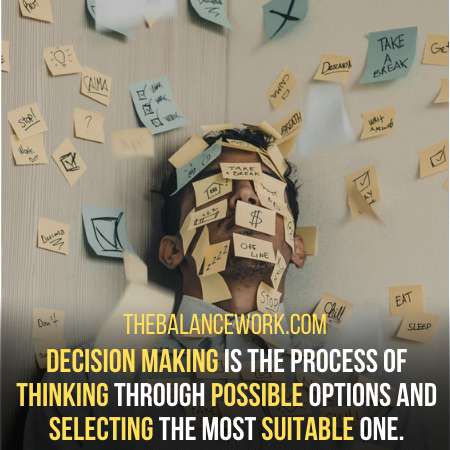
Before making decisions, you need to make a comprehensible strategy.
This strategy should have rules, regulations, and directions.
These strategies will help everyone to fasten decision making. And the decisions made then are reliable and unfailing.
Why make this strategy? With a given strategy, managers will feel no fear while making decisions.
Because all they need is a guide. With its help, they will be confident in dealing with all issues.
What you should know about managerial decision making?
Managerial decision making process is about top-level management making decisions. These decisions are for the betterment of the business.
What these decisions are? In a business, managerial decisions are like which product to produce. What price to charge. What should be the quantity of product produced?
How much to spend on the advertisement to promote sales. And how much investment expenditure to incur?
These are some of the questions related to managerial decision making process.
Why Managerial Decision Making Is So Important?
Managerial decision making is crucial for organizations. Because a false decision can ruin everything.
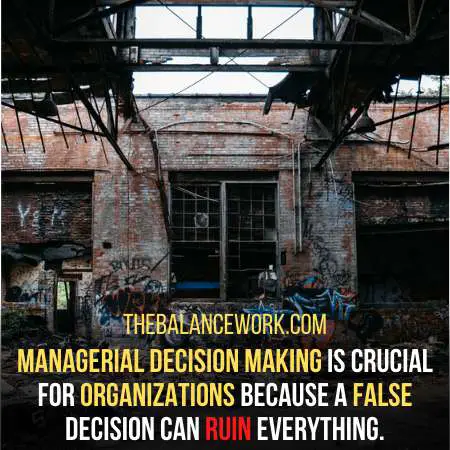
It is a suggestion for managers. That not to decide at the times when they are facing emotional stress.
They should also try to not make impulsive decisions. Because these may be wrong and mistakes might occur.
Wrong decisions are the biggest hurdle in achieving organizational goals. Organizational goals when not achieved cause the wastage of resources.
These resources can be money, manpower, and time.
There is no way to bring back the wasted resources. And the only way that can work is to avoid the wrong decisions.
This happens when the facts are complete and analysis is proper. Also, more people giving their opinions would be helpful.
That’s why managerial decision making is important. Because it avoids any uncertainty.
Rational decisions would not let an organization fall in any situation.
Primary Features Of Managerial Decision Making:
It’s to ensure that the process of making decisions is continuous in any organization. These decisions should have a significant impact.
This impact has an effect on the company and its partners.
1. Stakeholders:
Stakeholders are the individuals or masses that have an organization. And it includes customers, shareholders, and employees.
2. Top-level Management:
Top-level management makes decisions. And these decisions are either good or bad for the organization.
These decisions are effective for the organization’s betterment.
Better decisions can pull an organization to strive for a long period. While the business may get destroyed by bad decisions.
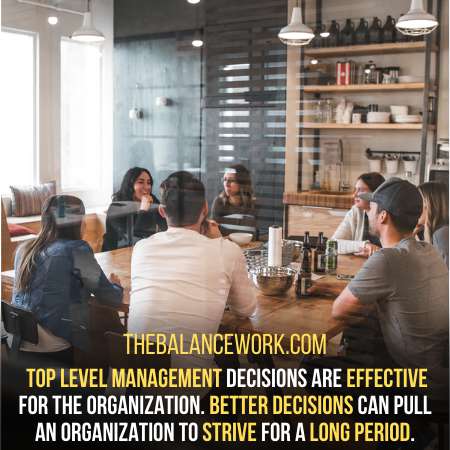
3. Low-level Management:
Low-level management doesn’t affect much the existence of the organization. But still, it can make a change by directly affecting the people working in the business.
Bad decisions of low-level management cannot make a firm lose its existence. And it can cause many unfavorable results like:
– Productivity reduces if the number of workers and supplies is not enough.
– Expenses increase in the case of so many workers and supplies. Especially when it is harder to store the supplies for long. Because they have a short life span.
– Morale reduces and frustration births in employees. It causes an increase in the turnover rate.
This can be high-priced for the business. Specifically when it comes to managing the people working there.
Most of the time, managers make critical decisions. As there is the involvement of a large number of choices and unexpected results.
As a manager, when you got to decide between different choices and unexpected results.
First of all, you need to gain more knowledge. This information will lead you to one more important decision.
4. What Amount Of Information Do do You Need To Decide Better?
Most of the time managers decide with incomplete information.
A good leader knows when to stop and flow the decisions into action. And collect more data required for that decision.

Also, he knows when to decide with the provided data. So the right time to make a decision is as important as the decision itself.
Too much delay in making decisions can be bad just like taking a decision in a hurry.
The failure in reacting quickly can miss opportunities.
But acting too fast on something can also be harmful. And this is because of the poor allocation of resources. So the project might have no chances of success.
Effective management is to decide when to gather enough information. Also, how to prepare to change the course if you get to know that the decision was poor.
Effective managers know that some tasks are so complex that failure becomes inevitable. But they also know it’s easier to cut the effect of a poor decision if it gets recognized soon.
5. Is There One Correct Option In Managerial Decision Making?
You should know that making a decision is not like a question paper having various options.
Management decisions may have multiple answers that are correct. So there are many good choices and one can’t decide which one is best.
6. Is there an ethical option in managerial decision making?
Sometimes managers have to decide in directions that could cause harm to others. So these decisions have social and behavioral inferences.
Behaviors are our perceptions about right and wrong.

Yet, all managers decide in such a way that cause an impact on others. So it’s necessary to keep in mind that our decisions will have a good or bad impact on others.
Managerial Decision-Making Process
Decision making is important for organizations. The ones that face problems and require decisions.
Managerial decision making runs by a process.
And every organization uses the decision-making process to make decisions.
There’s a brief description of this process for your better understanding.
This process consists of five steps:
1. Forming An Aim:
The first step while making the decision is to develop a goal.
A private organization may have the objectives to maximize their profits. But, the goal of a business enterprise would be the rise in sales and growth.
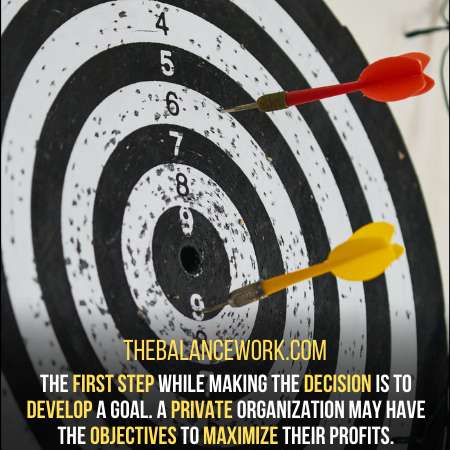
The public enterprise would have a wholly different goal. And its goal might consist of benefits to society.
2. Defining The Problem:
The second step is to define or identify a problem. The nature of the problem is important to identify. Because this is the base for decision making.
But before there is a need to identify the causes of the problem.
Once you find the reason for the problem. Then half of the solution gets into action.
3. Preparing Alternative Solutions:
After the identification, the next step is to find out alternative solutions.
For this, you can consider the variables impacting the problem. Then make a relationship between the variables and the problem.

So, you can develop different hypotheses. These hypotheses will become alternative solutions.
For example, an organization’s profits are declining. And the reason is inefficient machinery.
There are two possible alternatives to this problem.
1. Updating and replacement of the old machinery.
2. Building a whole new plant with the latest machinery.
The choice to use which alternative depends on which will give more profits.
4. Evaluating The Alternatives:
The next step is to check the alternative courses of action. You have to analyze the available data for this purpose.
Use this data for the evaluation of results expected from each course of action.
The most suitable solution will be the one which causes the firm to achieve the goal.
A manager has always to choose the solution remaining under certain constraints.
These constraints might be the availability of physical infrastructure or raw material.
The crucial role of a manager is to decide these constraints.
5. Implementing The Decision:
After the evaluation of alternatives and selection action is complete. The final step is the implementation of this decision.
To get the expected results, you need to do constant monitoring of implementation.
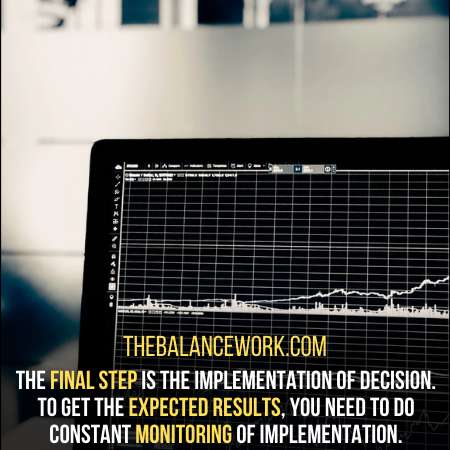
So you can take corrective measures in case if the implementation is not going right.
Yet, you can make time to time changes in the implementation. As the operating environment of the organization keeps on changing.
Conclusion:
The summary of managerial decision making is all about managers making rational decisions. And these decisions have a significant impact on the organization and stakeholders.
Managerial decision making revolves around complexity and time constraints. And it’s rare to have one right answer.
There are many options available. And a manager has to choose between one of these. He must weigh the expected results of each decision.
A manager should realize that the needs of stakeholders are always conflicting. And it is impossible to please everyone.
At last, managerial decision making can have ethical implications. And it is necessary to contemplate these implications before reaching a final decision.
Share your thoughts in the comment section below.
- 7 Jobs For People With Cerebral Palsy – Tips To Manage Yourself - October 6, 2022
- 15 Easy-On-Hand Jobs For People With Chronic Fatigue In 2022 - October 2, 2022
- 9 Effortless Jobs For People With Agoraphobia - October 1, 2022